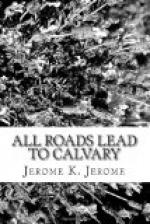There was a summer years ago—it came back to Joan’s mind—when she had shared lodgings with a girl chum at a crowded sea-side watering-place. The rooms were shockingly dirty; and tired of dropping hints she determined one morning to clean them herself. She climbed a chair and started on a row of shelves where lay the dust of ages. It was a jerry-built house, and the result was that she brought the whole lot down about her head, together with a quarter of a hundred-weight of plaster.
“Yes, I thought you’d do some mischief,” had commented the landlady, wearily.
It seemed typical. A jerry-built world, apparently. With the best intentions it seemed impossible to move in it without doing more harm than good to it, bringing things down about one that one had not intended.
She wanted to abolish steel rabbit-traps. She had heard the little beggars cry. It had struck her as such a harmless reform. But they told her there were worthy people in the neighbourhood of Wolverhampton—quite a number of them—who made their living by the manufacture of steel rabbit-traps. If, thinking only of the rabbits, you prohibited steel rabbit-traps, then you condemned all these worthy people to slow starvation. The local Mayor himself wrote in answer to her article. He drew a moving picture of the sad results that might follow such an ill-considered agitation: hundreds of grey-haired men, too old to learn new jobs, begging from door to door; shoals of little children, white-faced and pinched; sobbing women. Her editor was sorry for the rabbits. Had often spent a pleasant day with them himself. But, after all, the Human Race claimed our first sympathies.
She wanted to abolish sweating. She had climbed the rotting stairways, seen the famished creatures in their holes. But it seemed that if you interfered with the complicated system based on sweating then you dislocated the entire structure of the British export clothing trade. Not only would these poor creatures lose their admittedly wretched living—but still a living—but thousands of other innocent victims would also be involved in the common ruin. All very sad, but half a loaf—or even let us frankly say a thin slice—is better than no bread at all.
She wanted board school children’s heads examined. She had examined one or two herself. It seemed to her wrong that healthy children should be compelled to sit for hours within jumping distance of the diseased. She thought it better that the dirty should be made fit company for the clean than the clean should be brought down to the level of the dirty. It seemed that in doing this you were destroying the independence of the poor. Opposition reformers, in letters scintillating with paradox, bristling with classical allusion, denounced her attempt to impose middle-class ideals upon a too long suffering proletariat. Better far a few lively little heads than a broken-spirited people robbed of their parental rights.




